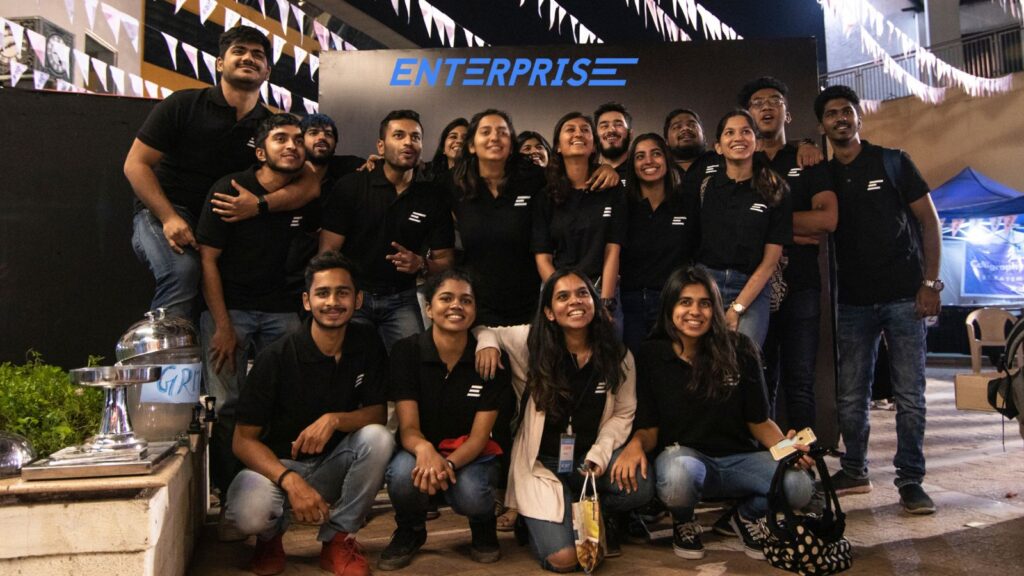Should I do an MBA? Should I do an internship? Should I join my family business? How do I gain confidence? How should I use my time? What skills do I need to develop?
These are some common confusions faced by college students who are interested in the world of business. Today, many young people dream of being ‘self-made’ and want to prepare themselves for the future of business using technology, design and collaboration.
The question we must aim to answer is, “How can we empower youth to develop an enterprising spirit?”
Have you ever taken a look at some of the biggest companies in the world and thought, “This is impossible for me” or “I am too young for this”. Going by usual standards, you are absolutely right. Most of these companies took years of struggle and grit to get where they are today. But you’re also wrong as every one of these companies started in a tiny little garage or room with minimal funds. They were started by someone who had an idea, and without too much analysis, started working.
William S. Harley was 21 when he planned to build a small engine capable of powering a bicycle. He built a motorcycle for the next two years, along with his friend Arthur Davidson. They worked from a friend’s 10 feet by 15 feet wooden shed with the words “Harley Davidson Motor Company” scratched on the door crudely. The rest is history.
Michael Dell started Dell Computers while he was studying at the University of Texas, Austin. He built the company from his ‘dorm-office’ and eventually went on to build the company full time. His initial investment was given to him by his family. The rest is history.
Karsanbhai Patel used to make detergent powder at his home garage in Ahmedabad. He would then go door to door, selling his hand-made product. He gave a money-back guarantee with every pack he sold. “Sabki Pasand Nirma” happened. The rest is history.
Ingvar Kamprad began his career when he was just six years old, selling matchboxes. His father gave him a small sum of money when he turned 17, and so he started a small business selling furniture made by local manufacturers and IKEA was born. The rest is history.
What do you think is one common factor amongst these people? No, it’s not that they were college dropouts!
The Highest Common Factor binding these people is that they were enterprising. They didn’t have the resources, money or funding. What they did have, though, was an attitude that says:
“I don’t know, but I will learn. This is the problem and I’m going to solve it. I will find out how to raise the needed resources.”
They had an attitude of action. They did not wait until they found all the answers. They started without waiting for conditions to be perfect.
Doing enterprising is about ‘not waiting for things to happen, but making them happen yourself’. For students, this means creating your own career blueprint. Ambitious people make things happen. They find problems that need to be solved and then gather the resources and know-how to solve them.
With this belief, the Enterprise India Fellowship was started 3 years ago. It wanted to provide a platform for young people to come together and develop enterprising skills much needed for the 21st century.
The Enterprise India Fellowship is a year-long, project-based learning experience for undergrad students.
Every two months, a cohort of 8 dynamic youth join the program. This group of ‘Enterprising-8’ have access to a community of like-minded peers, mentors, workshops, and projects. They have their own online community where they meet, share, discuss, plan projects and support each other’s career and personal development.
Over a duration of 12 months, they incubate a business or social project from scratch. They work with real money, real teams, real technology and real entrepreneurs on various projects. Also, they discover product ideas, work on consulting projects with start-ups, create marketing campaigns, involve volunteer teams, manage money and accounts, and plan and host online and offline events and get-togethers.
Anyone can build this kind of enterprising spirit. All you have to do is stop waiting for perfect situations. Just think about problems you want to solve and the interests you have. Gather the available resources and start working in your spare time. It doesn’t have to be a business idea – it could be a science experiment, an art project, a volunteering drive, an internship – anything that gets you ‘doing’. Theoretical knowledge is just not enough.
No matter what you are studying or precisely what career you intend to pursue, put your ideas into action, use your time wisely, and sharpen your spirit of enterprise.
For more details, visit: https://letsenterprise.in/
Aditya Jhunjhunwala, Founder – Enterprise India Fellowship

More Stories
Building with Purpose: VTDS’s Ethical and Sustainable Vision for India’s Defence Future
Excel CoolCoat Delivers Impressive Cooling of Buildings in Delhi: Roof Temperatures Drop by 19°C
Trailblazers Honoured at the House of Commons: Asian–UK Business Meet and Awards 2025 Celebrates Global Innovation and Bilateral Leadership